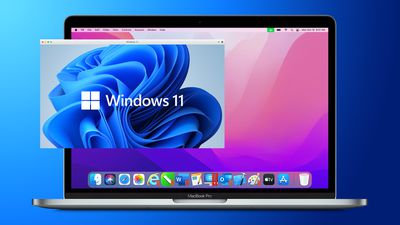Parallels Desktop for Mac Updated With Support for ProMotion Displays and M1 Ultra Chip
Parallels for Mac has announced Parallels Desktop 18, a new update that brings full support for the ProMotion displays in the 14-inch and 16-inch MacBook Pros, improved performance on the M1 Ultra chip, easier Windows 11 setup, and more.

Parallels Desktop 18 is designed to take full advantage of the latest Mac hardware, including the highest-end M1 Ultra Apple silicon chip. With the M1 Ultra in the Mac Studio, Parallels Desktop 18 "delivers up to 96% faster Windows 11" performance compared to previous versions of Parallels.
Full support for Apple's ProMotion display with automatic refresh rate changes and unleashed Apple M1 Ultra performance allowing users to assign more resources and get up to 96% faster Windows 11.
Parallels Desktop 18 also brings with it an improved Windows 11 installation experience and the ability to use a game controller on Windows 11 on the Mac.
Enhanced Windows game-play experience on a Mac: Users can now simply connect a game controller to their Mac, switch to Windows, and start playing. Enjoy smooth Windows UI and video playback, a higher frame rate, and much more.
Ahead of release later this fall, Parallels Desktop 18 includes support for new macOS Ventura features and functionalities. Additional new features include improved USB 3.0 support, improved compatibility of Intel (x86) applications, and more.
The
Standard Edition of Parallels 18 for Mac is priced at $99.99 per year or $129.99 for a one-time perpetual license to the current version, with students eligible for a discounted price of $49.99 per year. The
Pro Edition is priced at $119.99 per year, while the
Business Edition is priced at $149.99 per year.
Popular Stories
Apple is planning to launch new MacBook Pro models as soon as early March, but if you can, this is one generation you should skip because there's something much better in the works.
We're waiting on 14-inch and 16-inch MacBook Pro models with M5 Pro and M5 Max chips, with few changes other than the processor upgrade. There won't be any tweaks to the design or the display, but later this...
Wednesday February 11, 2026 10:07 am PST by
Juli CloverApple today released iOS 26.3 and iPadOS 26.3, the latest updates to the iOS 26 and iPadOS 26 operating systems that came out in September. The new software comes almost two months after Apple released iOS 26.2 and iPadOS 26.2.
The new software can be downloaded on eligible iPhones and iPads over-the-air by going to Settings > General > Software Update.
According to Apple's release notes, ...
It has been a slow start to 2026 for Apple product launches, with only a new AirTag and a special Apple Watch band released so far. We are still waiting for MacBook Pro models with M5 Pro and M5 Max chips, the iPhone 17e, a lower-cost MacBook with an iPhone chip, long-rumored updates to the Apple TV and HomePod mini, and much more.
Apple is expected to release/update the following products...
Apple plans to announce the iPhone 17e on Thursday, February 19, according to Macwelt, the German equivalent of Macworld.
The report said the iPhone 17e will be announced in a press release on the Apple Newsroom website, so do not expect an event for this device specifically.
The iPhone 17e will be a spec-bumped successor to the iPhone 16e. Rumors claim the device will have four key...
Apple acquired Canadian graph database company Kuzu last year, it has emerged.
The acquisition, spotted by AppleInsider, was completed in October 2025 for an undisclosed sum. The company's website was subsequently taken down and its Github repository was archived, as is commonplace for Apple acquisitions.
Kuzu was "an embedded graph database built for query speed, scalability, and easy of ...





















